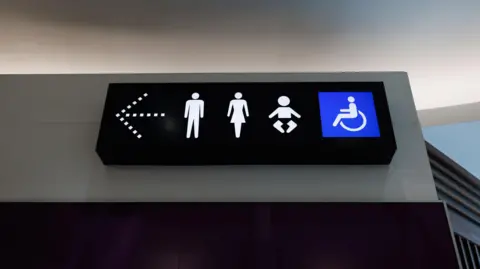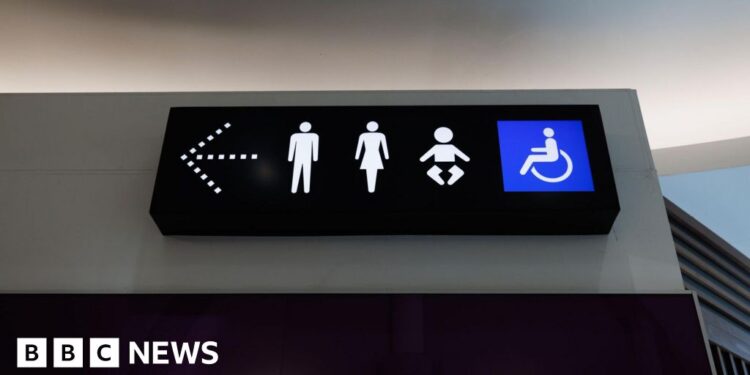Alison Holt,Social affairs editor,
Ewan Somerville and
Kate Whannel,Political reporter
 Getty Images
Getty ImagesTrans people could be asked about whether they should be accessing single-sex services based on their physical appearance or behaviour, new guidance seen by the BBC has said.
A code of practice, produced by the equalities watchdog and awaiting ministerial approval, says it may be legitimate for businesses or services to ask individuals to provide confirmation that they are of the eligible sex “by proportionate means”.
It acknowledges that there is “no type of official record or document in the UK which provides reliable evidence of sex” because people can self-identify on documents such as passports.
Equalities minister Bridget Phillipson said she’d take the time needed to “get this right”.
Phillipson, who received the code nearly three months ago, added that it was important to make sure women had access to single-service provisions such as rape crisis centres while ensuring that trans people are treated with “dignity and respect”.
The 300-page document was drawn up by the Equality and Human Rights Commission (EHRC) after the Supreme Court unanimously ruled that legally a woman should be defined by biological sex for the purposes of the Equality Act.
The EHRC has to provide practical advice to businesses and services about how this should work.
Following the Supreme Court ruling in April, the EHRC guidance says single-sex spaces should only be open to people of the same biological sex, otherwise they cease to be single-sex areas.
That would mean, for instance, that a trans woman – a biological male who identifies as a woman – would not be able to use women’s toilets and changing rooms.
The guidance says transgender people, who are also protected by equalities law, should be treated with dignity and respect.
The updated code of practice is awaiting approval. It can only gain legal force once it has been signed off by ministers and has been laid in Parliament for 40 days.
The guidance, first reported by The Times, says that if there are concerns then decisions about access to spaces may need to be based on how someone looks.
“Evidence of such concern might include the individual’s physique or physical appearance, behaviour or concerns raised by other service users,” the guidance says.
It adds that if a transgender person is excluded from a space, the organisation should consider alternatives and that it would not be proportionate to leave the person without essential services, such as toilets.
The guidance acknowledges that providing alternatives may not always be possible due to space constraints or cost.
It also says “discrimination or harassment could occur” if a person is questioned about their sex and that such questions should be asked “discreetly”. Instances of excluding someone from a service should also be handled “as sensitively as possible”.
Last month, interim guidance was withdrawn and EHRC chair Baroness Falkner urged the government to speed up its approval of the new code, warning that some organisations were operating under old guidance, which had become unlawful in the light of the court’s decision.
Conservative shadow women and equalities minister Mims Davies has previously suggested Phillipson had chosen not to sign off the guidance because she did not want to damage her chances in the Labour Party deputy leadership election, which ended last month.
A source close to Phillipson described the claim as “utter nonsense”.
Approving the guidance could be unpopular in some parts of the Labour Party.
During the deputy leadership contest, Lucy Powell, who eventually beat Phillipson to the job, said “I think we have got some of the language not right on this, and particularly around some of the guidance that’s coming forward.”
Last month, 32 Labour MPs wrote to the EHRC arguing that the interim guidance it issued in April, would “open the door to discrimination and harassment against trans people”.
The interim guidance, which was withdrawn in October, is being challenged in the courts.
During the hearing in the High Court, the lawyer, representing the government, suggested the interim guidance may have been too simplistic and that access to spaces such as toilets could be judged on a case-by-case basis.
Speaking to Times Radio, education minister Josh MacAllister said the government was working “as fast as we can” but that there was no deadline for reaching a decision.
“We want to get it right, and if we don’t get it right it does risk putting this back into the courts and providing even greater uncertainty for people.”
Asked if the government was avoiding making a decision in the hope the issue would be forgotten about, he said that would be “really bad politics… because the problem isn’t going to go away”.
“These are massive issues… when you drill down into examples of how this might be applied, it has big implications for individuals, it has big implications for businesses and public services,” he said.
“The guidance, as it’s written, has implications for both how physical buildings are set up, but also how staff in those settings would need to determine and judge even whether somebody might look like a woman.
“And so we want to avoid being in a position where toilets are being policed by people.”
Source link : https://www.bbc.com/news/articles/cy0y07959djo?at_medium=RSS&at_campaign=rss
Author :
Publish date : 2025-11-20 16:34:00
Copyright for syndicated content belongs to the linked Source.














